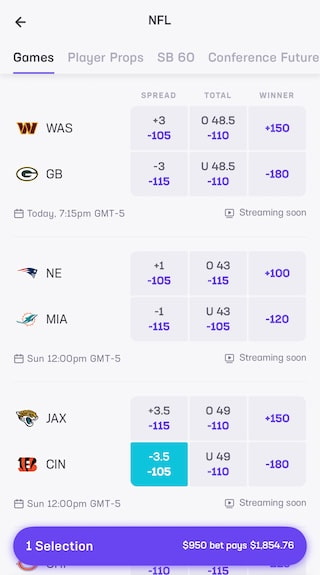If you plan to wager on NFL games this season, you've likely asked yourself what happens at tax time. Do you need to declare your NFL betting winnings? And how do sports betting losses fit into the equation?
Below, we've compiled a quick guide to NFL and sports betting taxes. We'll explain what you must report and which forms are needed when filing your returns.
Do You Have to Pay Taxes on Sports Betting?
Short answer: yes.
Bettors must pay taxes on sports betting wins. The IRS treats sports betting winnings the same way as any other income. Uncle Sam wants his share, regardless of whether you won $50 or $5,000.
All gambling winnings are considered ordinary taxable income by the federal government. This means your NFL betting winnings get taxed at your regular income tax rate, not a special gambling rate. If you're in the 22% tax bracket, your sports betting winnings will be taxed at 22%.
You must report taxes on sports betting winnings even if you didn't receive a tax form from your sportsbook. The rule is simple: if you win money betting on the NFL, you owe taxes on it. This applies whether you bet online, at a casino, or in a friendly office pool.
Most sportsbooks will send you Form W-2G if you win $600 or more. For wins over $5,000, they may automatically withhold 24% of that amount for federal taxes. However, this doesn't mean you're off the hook for smaller wins.

What Counts as Sports Betting Income for Tax Purposes?
Sports betting income includes any money you win from wagering on NFL games, NBA matches, fantasy sports leagues, or any other sporting events. This covers online sports betting sites like DraftKings, BetMGM, and FanDuel. As well as retail sportsbooks, and even fantasy football leagues with your friends.
The IRS doesn't distinguish between professional and casual betting. Whether you placed one Super Bowl bet or wagered every Sunday, all winnings count as taxable income.
Key Question
What if I'm a Professional Sports Bettor?
If sports betting is your primary source of income, the IRS may classify you as a professional gambler. This changes how you file your taxes. Professional gamblers must file Schedule C as self-employed individuals, paying self-employment tax on their net income.
How Do Sports Betting Taxes Work?
Sports betting taxes work exactly like regular income taxes. Your NFL betting winnings get added to your total annual income, and you pay taxes based on your overall tax bracket.
Let's say you earned $60,000 from your job and won $3,000 betting on NFL games. Your total taxable income becomes $63,000, and you'll pay taxes on that full amount, according to your tax bracket.
The thing is that you can't subtract losses from wins when reporting individual bets. If you lost $500 on one NFL game but won $800 on another, you must report the full $800 as income. You can potentially deduct the $500 loss, but only if you itemize your deductions.
How Much Do I Need to Pay in Taxes on Sports Betting Winnings?
Federal tax rates on sports betting winnings range from 10% to 37%, depending on your total income. These are the same tax brackets that apply to your regular paycheck.
For 2026, the tax brackets work as follows for single filers:
- 10% on income up to $11,925
- 12% on income from $11,926 to $48,475
- 22% on income from $48,476 to $103,350
- And so on up to 37%
If your NFL betting winnings push you into a higher tax bracket, only the amount over that threshold gets taxed at a higher rate (this is how marginal tax rates work). For example, if you earned $47,000 and won $3,000 betting on sports, only $1,525 of your winnings would be taxed at the 22%.
Are All Sports Betting Winnings Taxable?
Yes, all sports betting winnings are taxable. You technically owe taxes even if you win just $20 on an NFL bet. The IRS requires you to report all gambling income, whether you receive the W-2G form or not.
This means your office fantasy football league winnings are taxable, too. Your friends won't send you a W-2G, but you're still supposed to self-report that $200 you won for picking the best fantasy lineup.
How to Declare Taxes on Sports Betting Winnings
You report sports betting winnings as ‘gambling income’ on Form 1040, Schedule 1, line 8b. This gets added to your other income sources and becomes part of your total taxable income for the year.
That’s why it pays to keep detailed records of all your sports bets. Write down dates, amounts wagered, winnings, and losses for every NFL bet you place. It helps that most sportsbooks provide year-end summaries.
You must report all winnings, even if you didn't receive a W-2G form. The IRS expects you to track this information yourself.
About Form W-2G
Form W-2G reports sports betting winnings to both you and the IRS. Sportsbooks must send you this form by January 31st of the following year if you meet the thresholds.
You'll receive a W-2G for sports betting if:
- You won $600 or more, AND
- Your winnings were at least 300 times your wager
For example, betting $5 on 200-to-1 odds and winning $1,000 would trigger a W-2G. The form shows your total winnings and any taxes that were withheld.
What Forms Do I Need to Use When Reporting Sports Betting Winnings?
Use Form 1040, Schedule 1, to report your sports betting winnings. Enter the total amount on line 8b as gambling income. If you received multiple W-2G forms, add them all together.
If you have gambling losses to deduct, you must itemize using Schedule A, Form 1040. Remember that you can only deduct losses up to the amount of your winnings, and only if itemizing gives you a bigger deduction than the standard deduction.
How to Deduct Sports Betting Losses
You can deduct sports betting losses, but only up to the amount of your winnings. If you won $2,000 betting on NFL games but lost $5,000, you can only deduct $2,000 in losses. The remaining $3,000 can't be used to offset other income.
You must itemize your deductions to claim gambling losses. This means giving up the standard deduction of $15,000 for this year. Only itemize if your total deductions exceed the standard deduction amount.
Sports Betting Taxes by State
State taxes on sports betting winnings vary widely across the country. Some states, like Nevada, don't impose taxes on sports betting winnings, while others impose their own rates on top of federal taxes.
Most states with income taxes also levy taxes on your sports betting earnings. This means you might owe both federal and state taxes on your NFL betting wins. States typically tax gambling winnings at their regular income tax rates. So, in most cases, you owe both federal and state income taxes on your sports betting spoils.
This means you should check your specific state's rules for sports betting taxes. Some states have reciprocal agreements, while others may require you to file returns in multiple states if you bet while traveling. If you live in Texas (no state income tax) but win while betting in New York, you might owe New York state taxes on those winnings.

